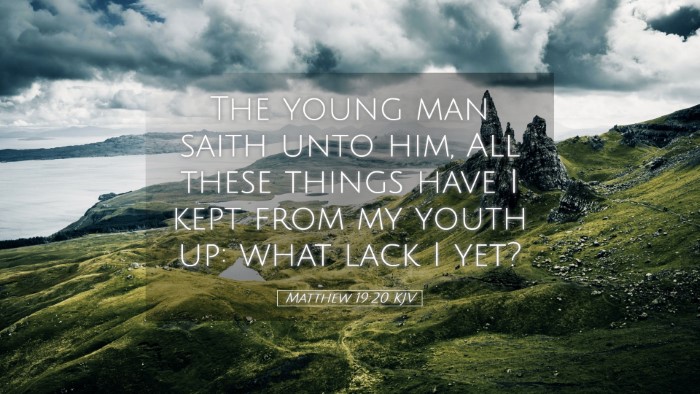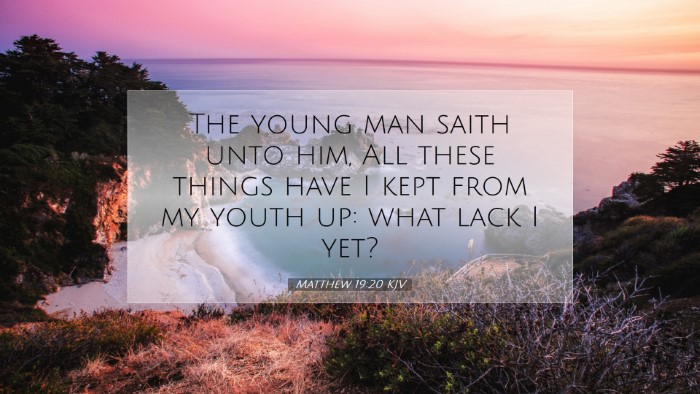Commentary on Matthew 19:20
Matthew 19:20 states: "The young man said unto him, All these things have I kept from my youth up: what lack I yet?"
This verse arises in the context of the larger narrative where Jesus encounters a young ruler who is inquiring about eternal life. It is a pivotal moment that sheds light on the nature of righteousness, the heart's motives, and the challenges of discipleship.
Analysis of the Young Man’s Statement
The young ruler's response, "All these things have I kept..." reveals much about his character and understanding of the Law. He perceives his compliance with the commandments as sufficient; however, this raises critical theological discussions regarding the nature of righteousness.
-
Confidence in the Self:
Albert Barnes highlights that the young man's confidence is misplaced. He believes that by adhering to the Law, he can secure his standing before God, indicating a superficial understanding of what it means to be righteous.
-
Legalism vs. True Righteousness:
Adam Clarke emphasizes that his adherence to the commandments is a form of legalism. While he follows the letter of the law, there is no indication of an inward transformation or love for God, which Jesus would later reveal as the essence of true righteousness.
The Nature of the Question
The query, "what lack I yet?" is profound. It reflects an internal struggle that many believers face. This highlights his awareness that mere law-keeping is insufficient for eternal life.
-
A Search for Assurance:
Matthew Henry notes that this question signifies a search for assurance of salvation. The young ruler is looking for confirmation that his actions are enough, demonstrating a universal desire for security in one's relationship with God.
-
Spiritual Poverty:
This question echoes the sentiments of many seeking fulfillment in spiritual matters. The young ruler's acknowledgment of a lack hints at a spiritual poverty that he cannot immediately comprehend.
The Encounter with Jesus
The dialogue that follows this verse reveals Jesus’ response to the young ruler. It is a moment of confrontation not just with the man’s understanding of the commandments, but with his very identity.
-
Invitation to Discipleship:
Jesus invites the young ruler to sell all he has, an act that Matthew Henry sees as a call to true discipleship—a breaking away from worldly attachments to embrace a life of radical obedience to Christ.
-
Revealing the Heart:
This challenge reveals the heart of the young man. Clarke points out that material possessions can often become idols in our lives, and the call to renounce them is essential for anyone seeking to follow Christ authentically.
Lessons for Believers
The account of the young ruler serves as a cautionary tale for believers in every generation. It underscores several lasting truths about faith, assurance, and discipleship.
-
Understanding of Law and Grace:
Barnacle reminds readers that the young man represents those who seek justification through works. This moment serves to illustrate the gap between human effort and divine grace. True righteousness comes not through law, but through faith in Christ.
-
Call to Surrender:
Jesus' call to sell all and follow Him is an ongoing theme in Christian discipleship. Pastors and leaders must remind their congregations that discipleship requires radical surrender and prioritizing the Kingdom of God above all else.
-
Awareness of Spiritual Gaps:
The young ruler's question alerts believers to the realities of spiritual self-deception. It is critical to engage in spiritual inventory to discern what hinders one's relationship with God, engaged by prayer and reflection.
The Broader Context
Placing this verse within the broader context of Jesus’ ministry illuminates His teachings on wealth, righteousness, and the nature of the Kingdom of God. Jesus often challenged societal norms and the understanding of righteousness held by the religious elite of His time.
-
Challenge to the Wealthy:
The encounter is also significant considering its setting in a culture that highly valued wealth. Jesus' instruction to the young man serves as a radical critique of the misconception that wealth equates to divine favor.
-
Radical Kingdom Values:
Matthew Henry points out that this passage foreshadows the radical nature of the Kingdom of God that overturns social, economic, and religious structures. The call to abandon material security stimulates vital discussions regarding priorities in the life of believers today.
Concluding Thoughts
Matthew 19:20 invites deep reflection for pastors, students, theologians, and scholars. It not only challenges the reader to consider their own spiritual state but also reflects the intensity and urgency of Jesus' call to discipleship. The inquiry of the young ruler elicits a timeless question for every follower of Christ: "What lack I yet?"
As believers seek to live faithfully in this fragmented world, may they lean into the radical nature of the Gospel, responding to Jesus' call with open hearts and surrendered lives.


